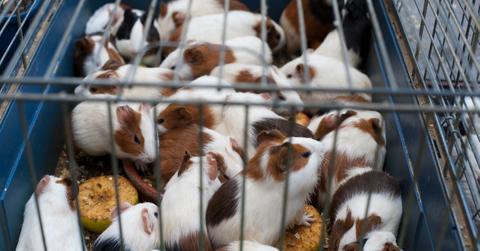Nine New Non-Animal Cosmetic Tests Approved in China, Bringing the World a Step Closer to Ending Animal Testing
There's still a long way to go when it comes to banning animal testing, but this is an important step.
Updated April 4 2019, 4:08 p.m. ET

Currently, China is the only country on the planet to require animal testing on cosmetics. But thanks to animal rights groups pressuring the Chinese government to cease animal tests, the country has loosened its regulations several times in recent years. Most recently, China approved nine new methods of pre-market cosmetics testing that do not involve animals.
The Institute for In Vitro Sciences (IIVS), a non-profit organization that researches non-animal (in-vitro) methods of testing, shared the news in a press release on EurekAlert! on Wednesday, April 3. As the IIVS explained, on March 22, China's National Medical Products Administration (NMPA) officially approved nine methods of non-animal methods of pre-market cosmetic testing. The tests include Direct Peptide Reactivity Activation Assay, which can determine how skin will react to a product, and Short Time Exposure Assay, which studies eye irritation potential.
IIVS reported that the new methods will come into effect on January 1, 2020, and that they will be "the preferred toxicological tests for the registration and pre-market approval of cosmetic ingredients." Basically, this does not mean that China no longer requires pre-market animal testing, but rather that certain researchers may default to these new, less cruel methods.
"We have seen first-hand how the partnership with NIFDC and our training program have built capacity and proficiency in alternatives," Erin Hill, President of IIVS, said in a statement. "The opening of the alternatives laboratory at the Zhejiang Institute for Food and Drug Control (ZJIFDC) is a wonderful example of how laboratories can expand to offer training and testing services in alternative test methods."
In China, all special-use cosmetics and imported cosmetics must be tested on animals before they hit the market, according to PETA. However, any non-special use cosmetics product that is both manufactured and sold in China still must be tested on animals. That means any beauty product sold in China cannot be certified cruelty-free. If you ever see a brand claim that it "only tests on animals where required by law," that means the brand tests its products on animals in China, and the brand is not actually cruelty-free. For more information on this, check out Cruelty Free Kitty's explainer on animal testing in China.
Last month, the NMPA announced that routine post-market testing in China will no longer include animal tests. But as Humane Society International noted on Twitter: "However, in the case of non-routine tests, eg: a consumer complaint about a product, unless/until authorities accept modern non-animal eye/skin irritation tests, and invest in local infrastructure to use such tests, animal testing could still be the default." Basically, Chinese authorities might still favor animal tests for post-market testing.
These nine new methods of non-animal testing provide a ray of hope that one day, China will completely banish animal testing. In the meantime, you can protest animal testing by only buying cruelty-free and vegan cosmetics, by donating to causes that are fighting against animal testing, and by contacting brands and asking them to stop testing on animals.